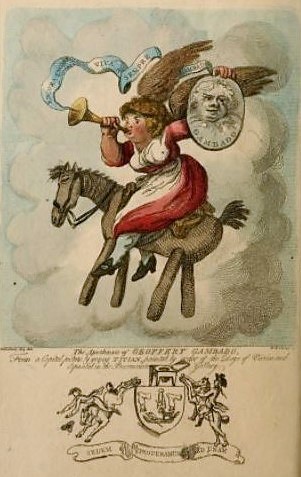
frontispiece to Annals of Horsemanship (Dublin, 1792)
MEANING
paraphernalia: miscellaneous articles or equipment
ORIGIN
This noun is from Medieval Latin paraphernalia, short for paraphernalia bona, meaning married woman’s property. This was a noun use of the neuter plural of the Medieval Latin adjective paraphernalis, based on Greek παράφερνα (= parápherna), neuter plural meaning goods which a bride brings over and above her dowry. This Greek noun is from παρα (= para), meaning distinct from, and ϕερνή (= phernē), dowry. This Greek word for dowry, i.e. for what a woman would bring to marriage, is from the verb ϕέρειν (= phérein), to carry, to bring.
In Roman Law, parapherna denoted those articles of property held by a wife over and above the dowry she brought to her husband, and which remained under her own control.
In most modern systems of law based on the Roman, paraphernalia bona (in French biens paraphernaux) means much the same thing as the Roman parapherna, but in English and Scottish Common law, under which all personal or movable property of a wife was vested ipso jure in the husband, the paraphernalia became restricted to such purely personal belongings of a wife as dress, jewels, and the like. While the husband retained legal possession of these, the wife had free use of them and retained them on her husband’s death. But in neither England nor Scotland did paraphernalia strictly include articles like household furniture, even if these had been marriage presents to the wife. Since the Married Women’s Property Acts of 1870, 1882, etc., the term has possessed little or no significance in English and Scottish legal practice.
By the 18th century, from the sense purely personal belongings of a wife, paraphernalia had come to also mean items belonging to a particular person, especially articles of dress or adornment, bits and pieces, trappings, hence the miscellaneous items needed for, or associated with, a particular activity. In Pasquin. A Dramatick Satire on the Times (2nd edition – Dublin, 1736), the English author and magistrate Henry Fielding (1707-54) wrote:
– Fustian: Thunder and Light’ning! Thunder and Light’ning! Pray don’t forget this when it is acted.
– Sneer-well: Pray, Mr. Fustian, why must a Ghost always rise in a Storm of Thunder and Light’ning? for I have read much of that Doctrine, and don’t find any mention of such Ornaments.
– Fustian: That may be, but they are very necessary: They are indeed properly the Paraphernalia of a Ghost.
And Annals of Horsemanship (Dublin, 1792) published a letter dated 26th March 1789, in which ‘Habakkuk Angle’ wrote the following:
A learned Student in Mathematics has long published his ability and desire to construct breeches upon geometrical principles.
Mr. Nunn is certainly ingenious, and his breeches, a few salient angles excepted, admirable; but the artist who should make bridles, saddles, and other equestrian paraphernalia, by the rules of pure mathematics, would render a much more praise-worthy service to the public.
The Greek verb ϕέρειν (= phérein) is also the origin of:
– metaphor, from μεταϕορά (= metaphorá), from μεταϕέρειν (= metaphérein), to transfer, a metaphor being a transferring of a word from its proper signification to another (therefore, the word metaphor is autological, that is to say, it has the property it denotes, it is itself a metaphor—similarly, the word oxymoron is an oxymoron);
– Christopher, from Χριστοϕόρος (= Khristophόros), Christ-bearing, denoting a legendary Christian martyr, adopted as the patron saint of travellers because it is said that he once carried Jesus Christ as a child across a river.
